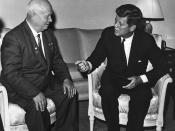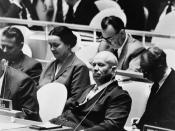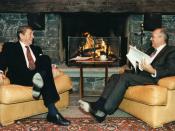U2 - Incidence
On May 1, 1960, two weeks prior to the United States-Soviet Summit in Paris, a U-2 high altitude reconnaissance airplane was shot down while flying a spy mission over the Soviet Union. The Eisenhower administration was forced to own up to the mission, and Khrushchev canceled the Paris Summit. As a result, The Cold War between the United States and the Soviet Union continued for over 30 years.
Shortly after the end of World War II, United States and the Soviet Union emerged as the two superpowers. These two former wartime allies found themselves locked in a struggle that came to be known as the Cold War. Eisenhower saw the Cold War in stark moral terms: "This is a war of light against darkness, freedom against slavery, Godliness against atheism." But the President refused to undertake an effort to "roll back" Soviet gains in the years after WW II.
Early in his administration he embraced a policy of containment as the cornerstone of his administration's Soviet policy. Eisenhower rejected the notion of a "fortress America" isolated from the rest of the world, safe behind its nuclear shield. He believed that active US engagement in world affairs was the best means of presenting the promise of democracy to nations susceptible to the encroachment of Soviet-sponsored communism. Additionally, Eisenhower maintained that dialogue between the US and the Soviet Union was crucial to the security of the entire globe, even if, in the process, each side was adding to its pile of nuclear weapons.
The death of Soviet leader Joseph Stalin, two months into the Eisenhower presidency, gave rise to hopes of a more flexible, accommodating Soviet leadership. In 1953, Eisenhower delivered a speech underscoring the potential human cost of the Cold War to both sides.
Hoping to strike...


